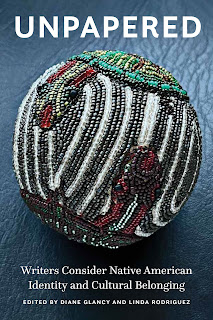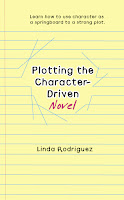by Linda Rodriguez
I have now edited seven anthologies. They have gathered together poetry, short fiction, and creative nonfiction from a wide variety of writers. My seventh anthology, Unpapered: Writers Consider Native Identity and Cultural Belonging, my first with creative nonfiction, publishes today.
This anthology began with an idea that sprang up in my mind after a conversation over coffee with another writer at a national writers' conference in 2011, so it has had the longest parturition of any of my anthologies. This project has suffered through a major loss of grant funding, the dissolution of its original publisher, a global pandemic, and my own physical injuries and illnesses leading to disability. I am actually amazed that it has managed to become a reality.
According to the catalog and jacket copy (which I must admit, in the spirit of transparency, is based on copy that I wrote):
"Unpapered is a collection of personal narratives by Indigenous writers exploring the meaning and limits of Native American identity beyond its legal margins. Native heritage is neither simple nor always clearly documented, and citizenship is a legal and political matter of sovereign nations determined by such criteria as blood quantum, tribal rolls, or community involvement. Those who claim a Native cultural identity often have family stories of tenuous ties dating back several generations. Given that tribal enrollment was part of a string of government programs and agreements calculated to quantify and dismiss Native populations, many writers who identify culturally and are recognized as Native Americans do not hold tribal citizenship.
"With essays by Trevino Brings Plenty, Deborah Miranda, Steve Russell, and Kimberly Wieser, among others, Unpapered charts how current exclusionary tactics began as a response to “pretendians”—non-indigenous people assuming a Native identity for job benefits—and have expanded to an intense patrolling of identity that divides Native communities and has resulted in attacks on peoples’ professional, spiritual, emotional, and physical states. An essential addition to Native discourse, Unpapered shows how social and political ideologies have created barriers for Native people truthfully claiming identities while simultaneously upholding stereotypes."
What that pretty academic copy doesn't tell you is that Native identity is one of the most fiery political hot potatoes around. The flames have been building ever since the first exchange of insults between Donald Trump and Elizabeth Warren, and they have flared up until they threaten to burn Indian Country alive. Many of you may have read articles in major newspapers such as the San Francisco Chronicle, Los Angeles Times, Washington Post, and the New York Times dealing with this issue in the last couple of years, but for those of us in the thick of it, the battle has been going on daily and building in violence for years now.
My hope for this anthology is to open up the conversation and to present a wide swath of Native experience. So I went to a group of talented Native poets and fiction writers and asked them to tell me who they were and how they got to be who they were. Some of the contributors are card-carrying citizens of their sovereign Native nations. Some of them have varying degrees of lineage and cultural connection to those same sovereign Native nations. Some of them take a hard line against anyone who is not a card-carrying citizen, and some of them don't. All of them show what it means to be a Native American in today's modern world. I like to think of this book as a diamond or some other kind of gem, that has been cut and polished, so that all of its many facets capture and reflect the light to illuminate the topic and make it easier for all of us to humanly understand it.
As you can imagine, shepherding this book throughout the entire process has been an exhilarating and ennervating experience. But it has come together, all the dissonant voices have blended into a powerful choral music. It's beautiful, and I love it. Let me take a few moments to breathe in the satisfaction of bringing all of this together successfully. Before it hits the public sphere and the controversy begins with me in the hotspot and a target on my back. Before the inevitable error or typo on one of the pages that managed to make it through the painstaking editing and copy editing and proofreading hits the eye of our staunchest critic. Before someone begins the eternal complaint that they should have been included in this anthology and it is the gravest of injustices that they were not. Before all of these things happen–that I know will happen–let me hold the beautiful book in my hand and think how happy I am with the way it all came together.
Linda Rodriguez has published 13 books. Her co-edited anthology, Unpapered: Writers Consider Native American Identity and Cultural Belonging, is available now. Plotting the Character-Driven Novel is based on her popular classes. Her novels—Every Hidden Fear, Every Broken Trust, Every Last Secret—and books of poetry— Dark Sister, Heart's Migration, and Skin Hunger—have received critical recognition and awards, such as St. Martin's Press/Malice Domestic Best First Novel, International Latino Book Award, Thorpe Menn Award for Literary Excellence, Latina Book Club Best Book, Midwest Voices & Visions, and Ragdale and Macondo fellowships. Rodriguez is past chair of AWP Indigenous Writer’s Caucus, founding board member of Latino Writers Collective and The Writers Place, and member of Native Writers Circle of the Americas, Wordcraft Circle of Native American Writers and Storytellers, and Kansas City Cherokee Community. http://lindarodriguezwrites.blogspot.com.



Congratulations on bringing to publication this anthology, Linda. I suspect herding cats may have been easier and less time consuming, but to see an idea you had come to fruition must be a great pleasure. May you and your authors enjoy your success.
ReplyDeleteCongratulations, Linda. What a timely and important book. I'm looking forward to reading it and expanding my knowledge base.
ReplyDeleteSounds interesting.
ReplyDeletePerhaps it will provide some insight for me into the pain of some people close to me. My daughter had a disasterous break-up over cultural differences with a Native man to whom she was engaged, and a brother-in-law has turned his back on his father's tribal connections.
In some ways not my business at all, but I would like to understand better.
It must have been an endurance contest, Linda. Twelve years between conception and fruition is a long time. How did you determine who to ask? Is it all fiction or masked true tales?
ReplyDeleteThanks so much, Jim. Oh, and you are absolutely right about the herding cats it, although I must say my contributors are a lovely bunch and were a dream to work with.
ReplyDeleteKait, I think you'll enjoy it. These are some wonderful wr
ReplyDeleteWriters, and they are telling some fabulous stories.
KM, this is a terribly contentious issue. It goes in cycles. They're always are a few hardliners, but then a couple of really bad con artists pretending to be native wind up in the headlines and doing damage to the community and the tribes they claim. Then that little tiny core of hardliners swells, and the vitriol just becomes unbearable. The unfortunate thing is that since the Elizabeth Warren case that upswelling of hardliners has not ever swung back down to just that tiny core. It's like we're caught in the worst of the extremist flame, and I think a great deal of it is fed by the extremism that is just permeating the public sphere in America today.
ReplyDeleteE.B., all of it is true and nonfiction, albeit written with the techniques of poetry in fiction. Nobody is hiding behind any masks in this book and there are some fascinating stories. One woman, a dear friend and a great writer, has traced her family back to the conquistadors missions in Spain and the horrible things they did and she quotes from all the direct sources. There's humor, there's outrage, there's pathos--one woman, who has been the subject of attacks for not being a card-carrying citizen, writes about how her daughter's death came about because EMTs assumed they were Native and refused to give her the necessary help they knew she needed, claiming this person who was having a reaction to prescribed medicine for her disability was just another "Indian committing suicide."
ReplyDeleteE.B., also, I meant "poetry and fiction,"and I put out general calls for submissions throughout the Native literary community, as well as approaching a number of writers I knew I would want. Many people were excited and committed to making a contribution, but shortly thereafter the identity debate went into hyperdrive and became extra vicious and a large number of those committed people backed out or just ghosted me, out of fear of attack, I assume.
ReplyDeleteCongratulations! I look forward to reading it.
ReplyDeleteThank you so very much, Margaret!
ReplyDeleteCongratulations and wow - this is an important anthology. Thank you for the vision and all the work it took to see it through. Important and fascinating.
ReplyDeleteThanks, Molly! I think, as do many others, that this book is important and terribly needed. My hope is it's going to broaden the discourse which at this point is more like a sniping war, and show the diversity and richness involved in the topic. Along the way, I hope it will turn down the temperature.
ReplyDeleteLinda, what a wonderful labor of love—and such an important and meaningful book. I will definitely be reading this.
ReplyDeleteThanks so much, Lori! I think you'll really enjoy the work of these fine writers.
ReplyDelete